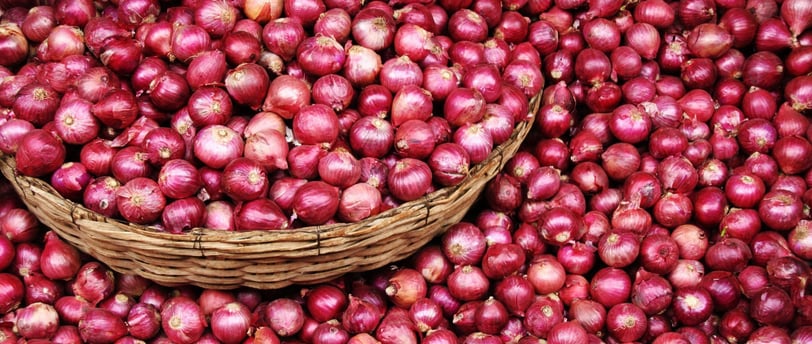5 impressive health benefits of onions
Onions are highly nutritious vegetables with several benefits, including improved heart health, better blood sugar regulation, and increased bone density.
HEALTH
1/9/20253 min read


Onions are members of the Allium genus of flowering plants, including garlic, shallots, and leeks.
They’re delicious, versatile, relatively cheap, and boast a wide range of healthy vitamins, minerals, and plant compounds.
The medicinal properties of onions have been recognized for thousands of years. Athletes in ancient Greece supposedly used onions to purify their blood, while medieval and traditional doctors prescribed them to help treat headaches, heart disease, and mouth sores.
Read on to discover the 9 health benefits of onions.
1. Packed with nutrients
Onions are nutrient-dense, meaning they’re low in calories but high in vitamins, fiber, and minerals.
One medium onion (110 grams [g]) contains:
Calories: 44
Protein: 1.2 g
Carbs: 10.3 g
Sugar: 4.7 g
Fiber: 1.9 g
Fat: 0.1 g
Potassium: 3.4% of Daily Value (DV)
Vitamin C: 9% of the DV
Onions are high in vitamin C, which may help regulate your immune health, collagen production, and iron absorption.
It’s also a powerful antioxidant that could help protect your cells from unstable, damaging molecules called free radicals.
Onions are rich in B vitamins, including folate and vitamin B6. These play key roles in metabolism, red blood cell production, and nerve function.
Lastly, onions are a good source of potassium, a mineral that may help with.
cellular function
fluid balance
nerve transmission
kidney function
muscle contraction
The average potassium intake is less than half the recommended DV of 4,700 milligrams (mg). So, adding onions to your diet is a great way to increase your potassium intake.
2. May benefit heart health
Onions contain antioxidants and compounds that may reduce your risk of heart disease by fighting inflammation and lowering triglyceride and cholesterol levels.
They contain a large amount of quercetin, a flavonoid antioxidant, and anti-inflammatory that may help lower high blood pressure.
A small 2015 study of 70 people with overweight and hypertension suggests that a daily dose of 162 mg of quercetin-rich onion extract may significantly reduce systolic blood pressure by 3.6 millimeters of mercury.
Also, a small 2014 study in 54 females with polycystic ovary syndrome found that consuming 80–120 g of raw red onions per day for 8 weeks lowered total and LDL (bad) cholesterol levels.
However, more research is needed.
3. Loaded with antioxidants
Antioxidants are compounds that inhibit oxidation, a process that may lead to cellular damage and contribute to diseases such as cancer, diabetes, and heart disease.
Onions are an excellent source of antioxidants and contain at least 17 types of flavonoids.
Red onions, in particular, contain anthocyanins, plant pigments in the flavonoid family that give red onions their deep color. These may protect against diabetes and certain types of cancer.
In 2016 involving 43,880 males, researchers found that habitual anthocyanin intakes up to 613 mg were correlated with a 14% lower risk of nonfatal heart attacks.
Similarly, the authors of a 2019 review concluded that consuming more anthocyanin-rich foods was associated with a lower risk of heart disease and death from heart disease.
4. Contain anticancer compounds
Allium vegetables such as onions and garlic may lower your risk of developing certain types of cancer, including stomach and colorectal cancers.
In a 2015 review of 26 studies, researchers concluded that people who consumed the most allium vegetables were 22% less likely to receive a diagnosis of stomach cancer than those who consumed the least.
In a 2014 review of 16 studies involving a total of 13,333 people, researchers suggested that people with the greatest onion intake had a 15% lower risk of colorectal cancer than those with the lowest intake.
Test-tube studies suggest that onion in A, a sulfur-containing compound in onions, may help decrease tumor development and slow the spread of ovarian cancer.
Onions also contain fisetin and quercetin, which are flavonoid antioxidants that may inhibit tumor growth.
5. Help regulate blood sugar
Eating onions may help regulate blood sugar levels, which is significant for people with diabetes or prediabetes.
A small 2010 study of 84 people with type 1 or type 2 diabetes found that eating 100 g of raw red onion significantly reduced fasting blood sugar levels after 4 hours.
A 2020 study showed that rats with diabetes who ate food containing 5% dried onion powder for 8 weeks had decreased fasting blood sugar levels and lower triglyceride and cholesterol levels than a control group.
Quercetin has also been shown to help regulate whole-body blood sugar balance by interacting with cells in the:
small intestine
pancreas
skeletal muscle
fat tissue
liver
Inspiration
Uplifting content to motivate and inspire you.
Connect
Support
motivatevibe@example.com
+1234567890
© 2024. All rights reserved.
